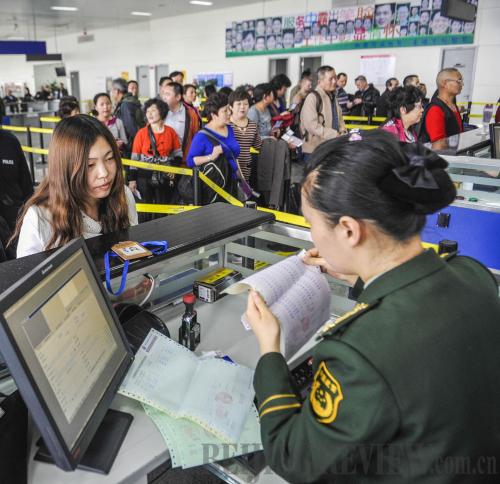|
 |
|
TAKE ME TO TAIWAN: A passenger checks in for the first direct flight from Urumqi, capital of northwest China's Xinjiang Uygur Autonomous Region, to Kaohsiung of Taiwan on March 12 (ZHAO GE) |
Consumer Prices Up
Due to rising food prices during the Spring Festival holiday (February 9-15), China's annual consumer inflation rate rebounded to a 10-month high of 3.2 percent in February, according to the National Bureau of Statistics (NBS).
CPI rose 1.1 percent in February, according to the NBS.
Food prices, which account for nearly one third of the weighting in China's CPI, remained a key driver of inflation in February, as the Spring Festival pushed up demand. Food prices jumped 6 percent in February, pushing the CPI up by 1.98 percentage points.
Considering the holiday effect and the increase of fuel prices in February, the rebound is largely in line with market expectations. However, the upward trend is unlikely to continue as the holiday effect fades and warmer weather starts to bolster food supplies, said Yu Qiumei, a statistician with the NBS, suggesting CPI growth will ease in March.
February's producer price index (PPI), which measures inflation at the wholesale level, fell 1.6 percent year on year, said the NBS. The drop marked the 12th straight month of decline after the PPI dropped in March 2012 for the first time since December 2009. On a monthly basis, the PPI gained 0.2 percent, the NBS data showed.
Helping Small Firms
The Ministry of Industry and Information Technology on March 8 unveiled a detailed plan to support the country's small and micro-sized enterprises, a sector that continues to face operation challenges.
Small and micro-sized companies have faced great operating pressures and rising costs, the plan notes.
It aims to promote the growth quality and efficiency of those enterprises by providing better public services, further improving financing services and alleviating their operating burdens.
The country will support more than 500 financing firms to help small enterprises get financing this year, according to the plan.
China will also provide training for 500,000 management personnel and 1,000 business leaders.
Small and micro-sized firms in China serve as a significant channel for creating jobs and spurring entrepreneurship.
| 